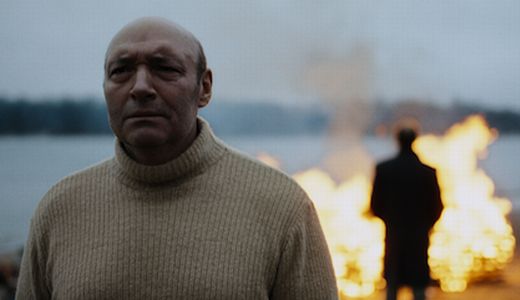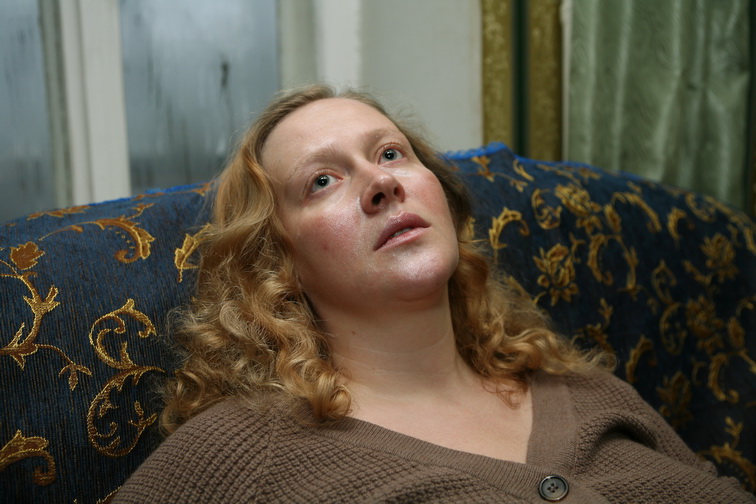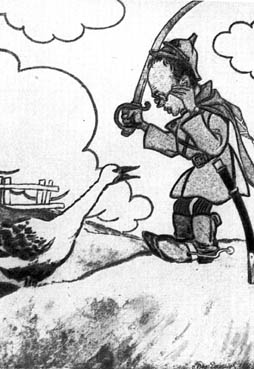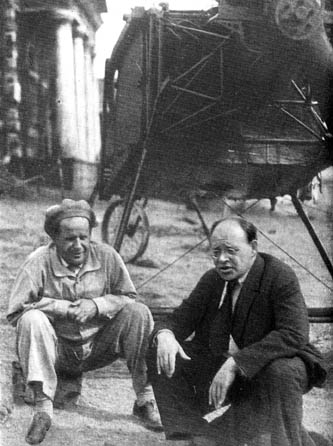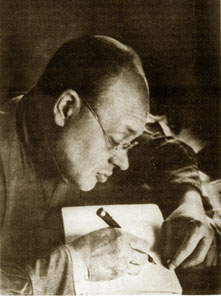Ever wondered what happened to Oedipus? Look for the answer in two very different recent films from Russia, Silent Souls (Овсянки, dir. Alexei Fedorchenko) and I Will Remember (Буду помнить, dir. Vitalii Votobyev, 2010). Silent Souls will be screened publicly by the SF Film Society at the end of December 2011.
Silent Souls (Ovsyanki) could have been shot by Fellini if he had been exiled to northern Russia and denied access to Kodak color film but could lay his hands on some desaturated version of Agfa. It felt l was watching some Northern version of Amarcord or La strada. No wonder it received the best cinematography prize (camera work by Mikhail Krichman) at the Venice Film Festival and was among the top three favorites to receive the Lion d'Or that year. Director Aleksei Fedorchenko sets out to tell a story about a tribal identity, almost forgotten and practically invisible (possibly, totally invented), yet concealing an ethnic difference as unsettling and relentlessly insistent – as a maddening itch between the toes of one’s amputated foot.
Visually, Ovsaynki, with its mildly infernal leaden color scheme and wan faces of its protagonists, can be classified as mournful elegy for a lost love, composed in Hades. No sun shines there and, given the story, it is just as well. Most of the plot is deals with a bereaved husband and his friend driving an SUV, the body of the dead wife in the trunk. Their destination is a woodsy riverbank where the pair spent their honeymoon decades earlier and where now the husband plans to hold his wife's funeral — in accordance with some ancient custom, rooted in the archetypal recesses of his Finno-Ugric tribal memory.
But as you get deeper into the story, you begin to realize that “Silent Souls” is really a puzzle about identity in the age of globalization. The main characters are two utterly average and average-looking middle-aged Russian guys. There is nothing special about them, except that they also happen to be descendants of an ancient Finnish tribe, by now almost completely forgotten, absorbed by ethnic Russians and their modern urban culture or, if you will, largely “globalized” out of existence. And yet, that ancient pre-modern world has left some of its tiny traces, still sufficient for reminding its descendents of their difference. Osip Mandelstam, writing about his largely secular childhood, observed that the family's Judaism, utterly vestigial, still reigned its odor: like musk oil, a tiny drop of it was sufficient to fill the whole house with its scent. Even less than a drop has survived of those ancient Finnish customs, and yet, we see that even a homeopathic quantity — a mere aura of the forgotten world — is capable of filling the space between the low-hanging, impenetrable cloud cover of the European north and its barren earth blanketed by sickly local flora where it has not yet been replaced by the anonymous twenty-first-century urban sprawl.
This is what makes “Silent Souls,” despite its ethnographic specificity, an allegory for the human condition of our age. The few ancestral traces that are left — names of rivers and odd fertility rites — are enough to create the urge to recover the rest but those who yield to it and search search to recover some mythic plenitude wind up before a black hole and as happens to the two main characters, get sucked into nothingness. The sparrow-like birds (the Russian ovsyanki of the film’s original title) that “remind me of something that I seem to have forgotten” (the narrator’s words early in the film) turn out to be the harbingers, not of fertility (Aphrodite's sparrows), but death. There is, then, a calculated mythic inevitability about the plot: what the main character has “forgotten” and is trying to recall with the aid of the ritual turns out to be — the death wish itself.
The story unfolds against the alternative world of an endless stream of cars on a superhighway and a “global” Japanese fast food in a shopping mall with its big box retail outlets. As the two protagonists trek through some deadly large appliances section of a Russian Costco, you begin to feel a chill spread down your spine. No amount of casual sex with the odd-looking girls, who seem to have been sent from the northern branch of Federico Fellini’s central casting, can compensate for the emptiness of the discount shop plenitude.
Fedorchenko seems to be offering us a moral: you can, if you wish, recover your lost identity – but only as you drive off the bridge into the Volga and join the world of the fish. This quiet despair about the human condition in the globalized world is what moved me deeply about this film. Fedorchenko shows people like us — twenty-first century, middle–class, educated — caught between the Scylla and Charybdes — between dissolving our identity in the globalized traffic flows of everything and trying to recover the imagined long-lost fullness of some communal, tribal life. If the movie is to be taken at face value, Odysseus was the last one to be able to steer clear of the two.
* * *
I Will Remember (Буду помнить), although not in the same league, is also about the "lost identity" nostalgia but of a completely different kind: a WWII melodrama that is good for your soul. The setting is Mineral Springs (Mineralnye body), a provincial town, a vacation spot, in the North Caucasus at the beginning of the war. The main protagonist is a an angry teenager, a Russian of Greek descent, who gets drawn against his will into helping a Russian boy of Jewish descent, a visitor form Leningrad, escape the holocaust after the Nazi invade his native town. If the color scheme in Silent Souls tends toward the mind-numbing leaden gray, I Will Remember dazzles with its gold, so warm and gentle that it could easily have been shot in Southern California. The golden glow has something to do with the nostalgic simplicity with which Russian tend to view the uncomplicated, if brutal, life in Stalin’s time. The erstwhile egalitarianism of poverty and the petty vanities of the petty ruling elite look refreshing — the Great Terror notwithstanding — to people used to the evermore rigid stratification and astronomical income inequalities of post-Soviet Russia. In the film, as the Soviet Army retreats from the town of Mineral Springs, Soviet order disintegrates and with it, the fabric of Soviet identities, revealing a society of far greater diversity in terms of class, ethnicity, religion, ethics, attitude towards the regime, and national commitment.
Remarkable for a film that appeals ostensibly to a wide audience (it may have been meant as a television movie), it reshuffles the deck of moral certitudes in such a way that even the evil characters gets to do good (a collaborator saved the protagonist who is about to be executed as a Jew) while the good ones, especially the boy’s father, can display bad judgment when faced with the choice between public weal, pleasing his boss, and the fate of his loved ones who depend on him for their survival.
One motif of the film is a handshake between the good and bad characters. Again and again, after a momentary hesitation, the hands are joined, as if in an allegory of an imperfect and ambiguous moral universe. The film clearly belongs to the age in which the necessity for moral compromise, at least a tactical one, is widely acknowledged. Such ethical sophistication is a far cry from the Russia of Tolstoy and Dostoevsky, let alone the Manichean ethics of the Soviet era. Not to belabor this point too much, though, in the film itself, justice triumphs, if imperfectly, and the family with the right moral instinct gets to have a future.
The two boys meet again in the epilogue, this time, as men in their seventies. If in Ovsyanki, the ordinary looking Russian men and women turn out to be, because of their ancestry, anything but ordinary, in I will Remember, the difference between Jews and Christians, originally so stark, is completely erased. The film opens with a fight between the two boys, each infuriated with an insult to his ethnicity, but in the epilogue, the Greek and the Jew, both in their hale seventies, meet again — one a well-known Russian author, the other an Israeli General — as if they were fraternal twins accidentally separated at a younger age.
* * *
No story about men and boys can remain neutral when it comes to the reenactment of the the myth of Oedipus. These two films are no exception, each tracing its own Oedipal “paternal lineage.” In Ovsyanki, the Oedipal tension is barely noticeable: narrator, though baffled by his father’s literary ambitions (his old typewriter) ethnographic eccentricities and alcoholism (he died in a fiery car crash), carries on his late father’s ethnographic project and fulfills his father’s most cherished wish, death by drowning, considered a good death in the local tribal tradition. This is the kind of a resolution to the Oedipal drama that forecloses the future.
By contrast, I Will Remember, is the conventional Oedipus squared. The main protagonist has to deal with two father figures, his real mercurial father, who had spent time in the Gulag, and the surrogate one, who by hook or by crook, tries to win the affections of the boy’s mother. Both are killed by the boy: the natural father inadvertently and unintentionally, the surrogate one in what could have been a murder suicide but turned out to be just a murder. I Will Remember doubly reaffirms the natural order of generational succession and for that reason offers its viewers a promising future, even if a melodramatic one. Ovsyanky, by contrast, drowns the history of the Finnish tribe in the upper Volga in the riverrun of time, along with the narrator and his friend. Fedorchenko thus disposes of the last survivors of the endangered species still in thrall to their archetypal roots. As the Volga waters close over their heads, the endless stream of the highway traffic above keeps flowing on, and on...
Copyright © 2011 by Grisha Freidin (gfreidin@stanford.edu)


